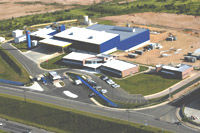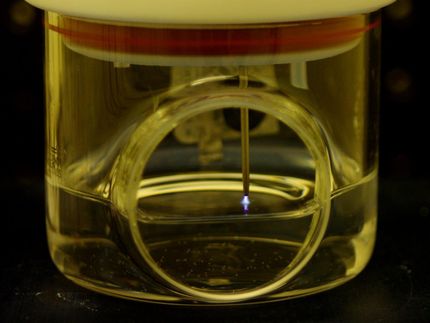BASF presents Innovation Award 2000
For the seventh time, BASF Aktiengesellschaft, Ludwigshafen, Germany, has presented its Innovation Award for new in-house developments and their successful implementation. The winners are polyvinylamine, a new class of process chemicals which enables paper to be produced more easily and in better quality, and a fast and highly efficient synthetic route to the UV-B absorber Uvinul MC 80.
The award, which BASF has presented annually since 1993 to the best in-house innovation, carries a total prize of DM 140,000 (about EUR 72,000).
"Innovations are intelligent products, processes and concepts which will shape our future. They are only possible through excellent teamwork and outstanding commitment by all participants", said Dr. Stefan Marcinowski, member of BASF's Board of Executive Directors and Research Executive Director. Many developments which have won the Innovation Award in the past have become success stories for BASF, he added. In 1999 alone, the award-winning projects since 1993 resulted in sales of more than EUR 700 million for the company - and the trend is rising.
A six-person team from Ludwigshafen won the award for the development of polyvinylamine: Dr. Jacques Dupuis, Dr. Friedrich Linhart, Dr. Primoz Lorencak, Dr. Martin Rübenacker, Dr. Andreas Stange and Manfred Winter increased the range of BASF paper chemicals with a product which makes paper more difficult to tear and also allows it to be more cheaply and with fewer production stoppages. By 2005, BASF expects annual sales of around 100 million Euro.
Dr. Michael Hüllmann and Dr. Christof Kandzia, also from BASF Aktiengesellschaft in Ludwigshafen, discovered a completely new process for the production of the UV absorber Uvinul MC 80. Their route is a "shortcut" of the conventional synthesis and it also gives a purer product. The low production costs mean an enormous competitive advantage. Uvinul MC 80 has consequently been a rapid market success - and is continuing to grow.
All-rounder makes paper more tear resistant and cheaper
From newspapers to teabags, from art prints to labels - our lives would be hard to imagine without paper. 300 million metric tons per year are produced worldwide. The everyday product is produced from chemical pulp, wood pulp and additives, such as starch, fillers, such as chalk or china clay, as well as increasingly also recycled paper. These ingredients are pulped with water, and the water is removed by sieving, drying and pressing in papermaking machines, some of which are enormous. At the end, the machines produce finished paper webs at a speed of 100 kilometers per hour. For the process to function properly, small amounts of cationic, i.e. positively charged, paper chemicals must be added to the stock. These products also keep the process water removed from the paper free from disturbing substances, for example tree resins or traces of adhesive from the recycled paper. This enables the water to be recycled in a closed circuit.
The paper chemicals used today are primarily linear polyacrylamides and highly branched polyethyleneimines. The former ensure that sufficient starting materials remain on the wire and that a paper web forms rapidly, while the latter have a similar effect and remove from the raw materials substances which would
Other news from the department
These products might interest you
Most read news
More news from our other portals
See the theme worlds for related content
Topic world Synthesis
Chemical synthesis is at the heart of modern chemistry and enables the targeted production of molecules with specific properties. By combining starting materials in defined reaction conditions, chemists can create a wide range of compounds, from simple molecules to complex active ingredients.

Topic world Synthesis
Chemical synthesis is at the heart of modern chemistry and enables the targeted production of molecules with specific properties. By combining starting materials in defined reaction conditions, chemists can create a wide range of compounds, from simple molecules to complex active ingredients.












































